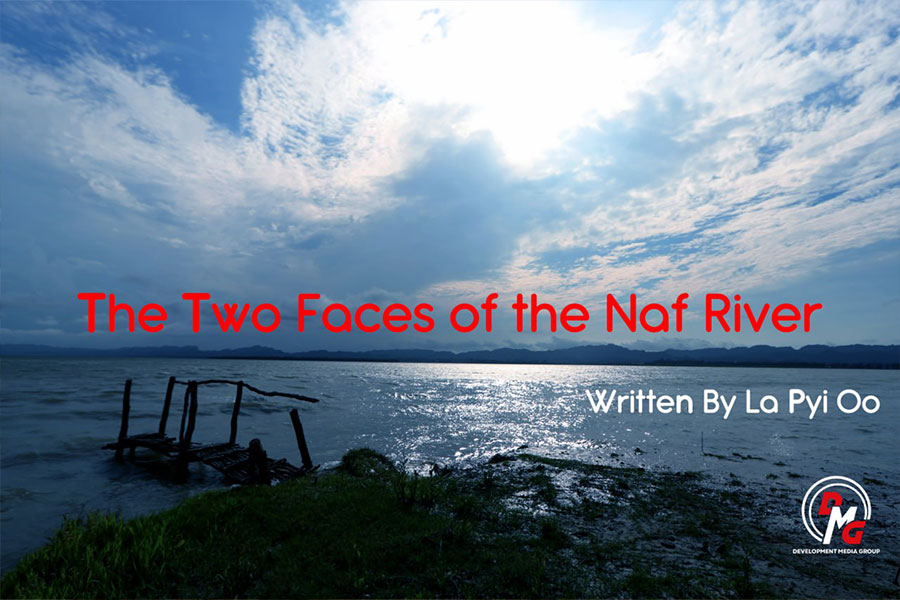- 15 mass casualty incidents from regime airstrikes reported in Arakan State since 2023
- Kyaukphyu IDPs forced to flee again amid junta airstrikes and artillery attacks
- New Diplomatic Movements Between Bangladesh’s New Government and the Arakan Public Administration
- Junta claims over 24 million ballots cast in 2025 poll, cites strong youth turnout
- ULA expands HIV prevention, healthcare services for sex workers in AA-held areas
The Two Faces of the Naf River
This article looks beneath the lovely image of the Naf to explore the bitter realities hidden beneath its surface.
10 Nov 2025

Written By La Pyi Oo
The long and beautiful Naf River separates Myanmar's Arakan (Rakhine) region and Maungdaw Township from Bangladesh's Teknaf Township. Bathed daily in golden sunlight, it is a strikingly picturesque river. Yet behind that beauty lie layers of security, economic, and social tension that weigh heavily on the lives of border residents.
This article looks beneath the lovely image of the Naf to explore the bitter realities hidden beneath its surface.
Disputes Over River Territory and Growing Tensions
The Naf River forms the westernmost edge of Arakan State and serves as a natural boundary marking the frontier between the two countries. While the river's beauty is a feast for the eyes, it has also become one of the main sources of disputes over control of its waters.
In recent months, repeated incidents of Bangladeshi nationals entering Arakan's waters without permission to fish have triggered frequent tensions between the Arakan Army (AA) and Border Guard Bangladesh (BGB).
According to local residents, Bangladeshi boats cross into the Arakan side of the Naf almost daily. These incursions, motivated by economic gain - the desire to harvest marine resources freely - also infringe on territorial sovereignty. As the AA has responded to block such activities, relations between forces on both sides have grown increasingly strained.
If this situation continues, it could seriously damage neighbourly relations and threaten regional stability. What began as an economic dispute among fishermen has now evolved into a political and security challenge.
Ordinary people on both sides of the river are anxious. They look to the authorities and both governments to resolve these problems effectively. Otherwise, the Naf risks becoming a lasting symbol of hostility and conflict.
Armed Groups Exploiting the Naf
Another, darker face of the Naf is its use as a convenient corridor for militant activity. Muslim extremist armed groups such as the Arakan Rohingya Salvation Army (ARSA), the Rohingya Solidarity Organisation (RSO), and the Arakan Rohingya Army (ARA) are known to exploit the river to easily cross into Maungdaw Township and launch attacks.
These groups have carried out bombings, killings, and robberies inside Arakan territory before fleeing swiftly back toward Bangladesh. Because they can slip across the river so easily, security in the border region remains under constant threat. Arakan civilians in particular live in fear of these violent acts.
The threat from these groups - which recruit new members and conduct military training in and around the refugee camps near Cox's Bazar - has left communities along the border living in fear and sleeplessness. Many residents stay up at night to keep watch. Such dangers erode people's psychological security and deepen mistrust within local society. The feeling that danger could erupt at any moment from across the river is a heavy burden for border residents.
According to the Arakan Army, some rogue elements within the BGB, driven by religious sympathy, have allegedly provided groups like ARSA, RSO, and ARA with training, technical aid, and other support to facilitate their operations. These developments not only undermine peace and stability in Arakan but also strain Bangladesh-Arakan relations and tarnish the beauty of the Naf River.
Stalled Border Trade and Economic Hardship
Beyond issues of peace and security, the Naf has also become the center of economic hardship. Border trade between Maungdaw and Teknaf once played a vital role in the livelihoods of local communities. But for the past eight months, this trade route has been suspended for various reasons.
The Bangladeshi government has stationed border guards along waterways and roads across the frontier, tightly restricting crossings and the movement of goods. As a result, traders in Maungdaw face immense difficulty. They can no longer export local products or import essential goods from the Bangladesh side, leaving the local economy gasping for air.
With business at a standstill, traders' incomes have dropped sharply, and unemployment is rising. Since border trade is a lifeline for these communities, only a swift resolution of the crisis will ease the economic strain now being felt across Maungdaw and nearby areas.
First Steps Toward Trust - and a Glimmer of Hope
Amid these growing tensions and economic troubles, a small ray of hope has emerged. Arakan Army Commander-in-Chief Major-General Twan Mrat Naing recently met Muslim community leaders in Maungdaw to initiate efforts toward peaceful coexistence.
As a first step following these meetings, the main Jameh Mosque in Maungdaw, which had been closed by the junta, was allowed to reopen. Such actions mark an important beginning in building trust and harmony among all local residents, regardless of religion or ethnicity. Whether this process can evolve into genuine, lasting peace remains to be seen.
Through gestures of mutual respect and confidence-building, the diverse ethnic and religious communities on both banks of the Naf may yet find ways to coexist. It is worth watching whether the Naf can transform from a line of division into a bridge of shared trust.
Conclusion
When we look at both faces of the Naf River, we see that alongside its natural beauty lie deep tensions, widespread fear, and severe economic hardship. Yet with mutual trust and cooperation, the Naf could become a strong, peaceful, and secure bridge linking communities.
Let us hope that one day, the sound of the Naf's flowing waters will echo as a song of peace.








.jpg)











